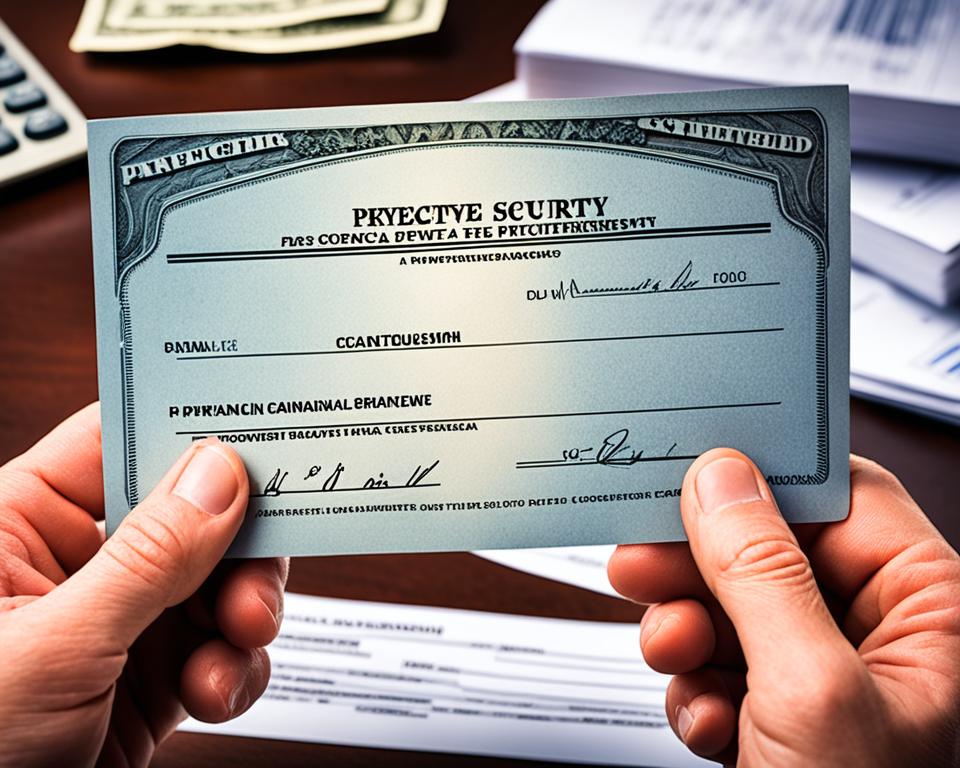Wage garnishment can be a daunting prospect for individuals struggling with credit card debt. Credit card companies have the ability to garnish wages as a means to collect on unpaid debts. However, it is essential to understand the laws and regulations surrounding credit card wage garnishment to protect your rights and financial well-being.
In this article, we will delve into the specifics of how credit card companies can garnish wages, the rules and limitations governing credit card wage garnishment, and steps you can take to safeguard your wages from being garnished.
Key Takeaways:
- Wage garnishment is a legal process where a portion of an individual’s earnings is withheld by their employer to pay off their debts.
- Credit card companies can garnish wages to collect on unpaid credit card debt, including joint debt with a partner or spouse.
- Federal law sets limitations on wage garnishment, with some states imposing additional restrictions.
- To protect yourself from wage garnishment, consider options such as debt forgiveness, repayment plans, and consulting with a lawyer.
- Understanding your rights and seeking professional guidance can help you navigate the complexities of wage garnishment and regain financial stability.
What is Wage Garnishment?
Wage garnishment is a legal process that occurs during the debt collection process when a person is unable to pay their debts. It is one of the final steps taken by creditors to ensure repayment. When a debtor fails to make payments, the creditor may send reminders and charge late fees, which can also negatively impact their credit score.
If the debt remains unpaid, the creditor may transfer the debt to a collections agency, which has the authority to sue the debtor for non-payment. If the court rules in favor of the debt collector, wage garnishment may be ordered. This involves the debtor’s employer withholding a specific amount from their paycheck and directly paying it to the debt collector.
Wage garnishment is a serious consequence that affects a debtor’s income and can significantly impact their financial well-being. It is crucial to understand how wage garnishment works, the debt collection process, and the potential consequences of missed payments. Additionally, it’s important to be aware of the impact wage garnishment can have on one’s credit score, as it can further complicate financial matters.
Wage garnishment is a legal process where a portion of a person’s earnings is withheld by their employer to pay off their debts.
Debt Collection Process
The debt collection process typically starts with missed payments. When a debtor misses payments, the creditor will likely send reminders and charge late fees. Continued non-payment can lead to the transfer of the debt to a collections agency, which may then proceed with legal action. This can result in the debtor’s wages being garnished to ensure repayment.
Missed Payments and Credit Score Impact
Missed payments not only increase the total debt owed but also have a detrimental impact on the debtor’s credit score. Creditors can report delinquent debt and the methods used to collect the debt, including wage garnishment. This negative information can remain on the debtor’s credit report for a significant period, making it more challenging to obtain credit in the future.
How Wage Garnishment Works
Once a court approves wage garnishment, the debtor’s employer receives an order to withhold a specific amount from the debtor’s paycheck. This amount is then paid directly to the debt collector. The garnished wages are used to repay the outstanding debt until it is fully satisfied, subject to limitations imposed by federal and state laws. These laws determine the maximum percentage of income that can be garnished, ensuring debtors have enough income to cover essential living expenses.
Debt Collection Process Summary:
| Step | Description |
|---|---|
| 1. | Missed Payments |
| 2. | Transfer of Debt to Collections Agency |
| 3. | Legal Action & Wage Garnishment |
| 4. | Employer Withholds Portion of Wages |
| 5. | Direct Payment to Debt Collector |
Can Credit Cards Garnish Your Wages?
When faced with unpaid credit card debt, many individuals wonder if credit card companies have the power to garnish their wages. The answer is yes, credit cards can garnish your wages if you have outstanding credit card debt.
Once credit card debt goes unpaid and is sent to collections, creditors have the legal right to seek a court order for wage garnishment. This applies not only to individual credit card debt but also to joint credit card debt shared with a partner or spouse.
However, it is important to note that there are certain limitations on wage garnishment for credit card debt. Federal and state laws determine the maximum amount that can be garnished from a person’s wages.
Understanding Wage Garnishment Limitations
Federal law, specifically the Consumer Credit Protection Act, sets a limit on the amount that can be garnished from each paycheck for ordinary garnishments. The maximum amount that can be deducted from a person’s income through wage garnishment is 25% of their disposable income (the amount after taxes and deductions) or the amount by which their income exceeds 30 times the federal minimum wage, whichever is lower.
It’s important to note that some states may have stricter limitations on wage garnishment for credit card debt. Individuals should familiarize themselves with the specific laws in their state to understand the maximum amount that can be garnished.
Furthermore, certain types of income, such as Social Security benefits, may be exempt from wage garnishment. These exemptions vary by state, so consulting with a legal professional or researching state-specific information is crucial.
Protecting Your Wages from Garnishment for Credit Card Debt
While credit card companies have the ability to garnish wages for unpaid credit card debt, there are steps you can take to protect your wages and navigate the debt collection process.
1. Communication: Stay in touch with your creditors and debt collections agencies. Ignoring notices or letters will not make the problem go away. Communication is key in negotiating repayment plans or exploring options for debt forgiveness.
2. Hardship Programs: Inquire about hardship programs offered by credit card companies. These programs may provide temporary relief by reducing interest rates or adjusting payment plans.
3. Debt Forgiveness: Discuss debt forgiveness options with your creditors. In some cases, they may be willing to reduce the amount owed or settle the debt for a lump sum payment.
4. Legal Assistance: If you receive a notice of a potential lawsuit related to your credit card debt, do not ignore it. Consult with an attorney who specializes in debt collection or consumer protection to understand your rights and explore legal options.
5. Bankruptcy: Although it should be considered as a last resort, filing for bankruptcy can provide immediate protection against wage garnishment. This option should be carefully evaluated and guided by an attorney.

By understanding your rights, limitations, and available options, you can take control of your financial situation and protect your wages from garnishment for credit card debt.
Limitations on Wage Garnishment for Credit Card Debt
Federal and state laws establish limitations on wage garnishment for credit card debt, providing certain protections for individuals facing financial difficulties. Understanding these limitations is crucial in safeguarding your income and financial well-being.
Under the Consumer Credit Protection Act, federal law sets restrictions on the amount that can be garnished from each paycheck for ordinary garnishments. The maximum limit is the lesser of 25% of a person’s income after taxes and deductions or the amount by which their income exceeds 30 times the federal minimum wage (currently $7.25 per hour).
Several states also impose additional limitations on wage garnishment, which vary from state to state. It is important to familiarize yourself with your state’s specific regulations to understand the extent of protection granted in your jurisdiction. Some states may have more stringent restrictions on the amount that can be garnished.
Exemptions from Wage Garnishment
While wage garnishment is a legal process, certain types of income are often exempt from garnishment. These exemptions help protect individuals from severe financial hardship and ensure that they have the means to meet their basic needs.
One example of exempt income is Social Security benefits. Federal law prohibits creditors from garnishing these benefits to repay credit card debt. Other exemptions may vary by state, such as allowances for employee pension benefits or public assistance funds.
It is important to note that exemption claims must typically be filed with the court, providing documentation and evidence to support your claim for exemption. Consulting with a legal professional can help you navigate the process and assert your rights effectively.
Understanding the wage garnishment limitations and exemptions is essential in protecting your income and financial stability. If you are facing credit card debt, it is advisable to seek guidance from a reputable nonprofit credit counseling agency or consult with a legal professional who specializes in debt collection to explore your options and ensure your rights are upheld.
How to Protect Yourself from Wage Garnishment
If your credit card debt has already been sent to collections, there are steps you can take to protect yourself from wage garnishment. Here are some key strategies:
- Contact the debt collections company: Reach out to the collections agency to discuss your options. They may be willing to offer debt forgiveness or create a repayment plan that fits your financial situation. It’s crucial to communicate with them and not ignore any notices or letters.
- Consider hardship programs: Some creditors offer hardship programs for individuals facing financial difficulties. These programs can provide temporary relief by reducing monthly payments or interest rates. Explore whether your credit card company has such programs available.
- Explore debt forgiveness options: In certain cases, you may be eligible for debt forgiveness. This can involve negotiating with the collections agency or credit card company to settle the debt for less than the full amount. It’s worth exploring this option to potentially avoid wage garnishment.
- Be proactive in legal matters: If you receive a notice of a potential lawsuit, do not ignore it. Instead, consider working out an agreement with the creditor or collections agency to avoid going to court. If a lawsuit is filed, consult with a lawyer to understand your rights and explore potential solutions, such as bankruptcy, which can protect your wages from garnishment.
Remember, taking proactive steps to address your credit card debt can help protect your wages from garnishment. Don’t hesitate to seek professional advice and explore various options to regain control of your financial situation.

Understanding Wage Garnishment and Your Rights
In situations where wage garnishment is a possibility, it is essential to have a clear understanding of your rights. The laws regarding wage garnishment can vary from state to state, so it is important to familiarize yourself with the specific regulations in your jurisdiction to protect your wages and financial well-being.
One of your rights regarding wage garnishment is the ability to file an exemption claim. This claim allows you to assert that a certain amount of your wages should be exempt from garnishment, based on factors such as your income level and financial responsibilities. Filing an exemption claim can help ensure that you have enough income to cover essential expenses and maintain a basic standard of living.
Challenging the garnishment in court is another right you may have. This involves presenting legal arguments and evidence to contest the garnishment or attempt to reduce the amount being garnished. It is important to note that legal proceedings can be complex, so seeking expert legal guidance from an attorney specializing in debt collection or consumer protection is highly recommended.
State Laws on Wage Garnishment
Understanding your rights regarding wage garnishment requires awareness and knowledge of the specific laws in your state. Each state has its own regulations governing how much of your wages can be garnished and under what circumstances. By familiarizing yourself with your state’s laws, you can better protect your wages and exercise your rights when facing garnishment.
State laws on wage garnishment can cover various aspects, including the maximum percentage of wages that can be garnished, limits on disposable income subject to garnishment, and exemptions for certain types of income or financial circumstances. It is essential to consult the laws in your state or seek legal counsel to ensure you have accurate and up-to-date information.
State Laws on Wage Garnishment
| State | Maximum Percentage of Wages Garnished | Exemptions |
|---|---|---|
| Alabama | 25% | Head of household, minimum wage earners |
| Alaska | 25% | Head of household, low-income earners |
| Arizona | 25% | Head of household, low-income earners |
Table: State laws on wage garnishment, maximum percentage of wages garnished, and exemptions for select states.
Remember, this table is a general overview. Please consult the specific laws in your state for accurate information.
By understanding your rights and the specific state laws on wage garnishment, you can better navigate the process and protect your wages from unnecessary garnishment.
The Long-Term Impact of Wage Garnishment
Wage garnishment can have significant long-term financial consequences. When a portion of your income is withheld to repay debts, it reduces your overall income, making it challenging to cover living expenses. This reduction can force you to make difficult financial adjustments and may lead to added financial stress.
Although wage garnishments may not directly appear on your credit reports, they can still have a negative impact on your credit scores. Creditors have the ability to report delinquent debt and information about how the debt is being collected, including the fact that it is being garnished from your wages. This negative information can remain on your credit reports for years, making it harder to qualify for credit in the future.
Another consequence of wage garnishment is the potential for missed payments on other financial obligations. The reduction in income from wage garnishment may make it difficult to keep up with your regular bills, such as rent or mortgage payments, utility bills, or credit card payments. Missed payments and late payments can further damage your credit score and create a cycle of financial hardship.
To illustrate this point, here’s an example:
John had his wages garnished to repay credit card debt. The garnishment reduced his monthly income by 25%. As a result, he struggled to pay his rent on time, leading to late payment fees and a negative mark on his credit report. This, in turn, lowered his credit score, making it challenging for him to secure loans or credit in the future.
It is important to understand the long-term implications of wage garnishment and take proactive steps to address your financial situation. By addressing credit card debt and other financial obligations to avoid wage garnishment, you can protect your income and work towards improving your financial well-being.
Impact of Wage Garnishment
| Consequences | Description |
|---|---|
| Reduction of Income | Wage garnishment reduces your overall income, making it challenging to cover living expenses. |
| Credit Score Consequences | Though not directly shown on credit reports, wage garnishment can still impact your credit scores by providing insight into your debt repayment history. |
| Missed Payments | The reduced income from wage garnishment may lead to missed payments on other financial obligations, further damaging your credit score and creating additional financial strain. |
| Negative Information on Credit Reports | Creditors have the ability to report the garnishment of your wages, providing negative information that can remain on your credit reports for years. |
How to Handle Credit Card Debt
If you are struggling to pay your credit card bills, it is essential to take action. There are several strategies you can employ to manage and ultimately eliminate your credit card debt. By implementing these tactics, you can regain control of your finances and pave the way for a debt-free future.
Negotiating Lower Payments
One effective approach to dealing with credit card debt is to contact your credit card issuer and negotiate lower monthly payments or interest rates. Explain your financial situation and express your commitment to paying off your debt. Many credit card companies are willing to work with customers who are experiencing financial hardship. By negotiating lower payments, you can make your debt more manageable and alleviate some of the financial burden.
Credit Card Forbearance
If you are facing temporary financial difficulties, credit card forbearance may be an option to consider. Credit card forbearance allows you to temporarily pause payments or reduce your payment amount without incurring late fees or damaging your credit score. Reach out to your credit card issuer and inquire about their forbearance programs. Remember to inquire about any potential interest or fees that may accrue during the forbearance period. This option can provide temporary relief while you work on improving your financial situation.
Repayment Options
Another approach to managing credit card debt is to explore different repayment options. One popular method is the debt snowball or debt avalanche method. With the debt snowball method, you focus on paying off your smallest debts first while making minimum payments on the rest. As you pay off each debt, you move on to the next, gaining motivation and momentum along the way. The debt avalanche method, on the other hand, involves tackling your debts with the highest interest rates first. By prioritizing high-interest debts, you can save money on interest payments in the long run.
Nonprofit Credit Counseling
If you need professional guidance and support in handling your credit card debt, consider reaching out to a reputable nonprofit credit counseling service. These organizations offer free or low-cost assistance and can provide valuable resources and strategies to help you get out of debt. Credit counselors can help you develop a personalized budget, create a debt management plan, and negotiate with your creditors on your behalf. Their expertise can give you the tools and confidence needed to tackle your credit card debt effectively.

Wage Garnishment Statistics and Impact
Wage garnishment affects a significant number of workers in the United States. According to the National Bureau of Economic Research, over 1% of workers have experienced wage garnishment, with an average duration of five months.
During this time, workers may lose a significant portion of their take-home pay, impacting their ability to cover essential expenses and maintain financial stability. Wage garnishment can result in a substantial reduction in income, making it challenging for individuals and their families to meet their financial obligations.
On average, workers facing wage garnishment lose a percentage of their income to debt collection efforts. The exact percentage may vary depending on the specific circumstances, including the type and amount of debt owed. However, it is critical to note that wage garnishment can result in a significant financial burden, making it crucial for individuals to address their credit card debt and other financial obligations promptly.
Debt collection prevalence is prominent, and the impact of wage garnishment extends beyond financial hardship. Workers facing wage garnishment may also experience increased stress, anxiety, and overall emotional distress due to their financial situation.
Addressing credit card debt and seeking solutions to resolve financial obligations can help individuals avoid the negative impact of wage garnishment. Exploring options such as debt management plans, negotiating with creditors, or seeking assistance from nonprofit credit counseling agencies can provide strategies for achieving financial stability and regaining control over one’s finances.
Statistics on Wage Garnishment and Debt Collection
Below are statistics highlighting the prevalence and impact of wage garnishment:
| Statistic | Percentage/Duration |
|---|---|
| Percentage of Workers Affected by Wage Garnishment | Over 1% |
| Average Duration of Wage Garnishment | 5 months |
| Percentage of Income Lost to Garnishment | Varies based on specific circumstances |
These statistics emphasize the need to address credit card debt and other financial matters promptly to prevent the detrimental consequences of wage garnishment.
The Role of Nonprofit Credit Counseling
Nonprofit credit counseling is an invaluable resource for individuals facing credit card debt and seeking to avoid wage garnishment. These organizations offer free assistance and tailored solutions to address your specific financial situation. With their expertise, you can develop a comprehensive strategy that includes budgeting assistance, debt management plans, and effective debt repayment solutions.
How Nonprofit Credit Counseling Can Help You
1. Budgeting Assistance: Nonprofit credit counseling agencies can help you create a realistic budget that accounts for your income, expenses, and debt obligations. By gaining a clear understanding of your financial situation, you can identify areas where you can cut back on expenses and allocate more funds towards debt repayment.
2. Negotiating with Creditors: Credit counselors have experience in negotiating with creditors on behalf of their clients. They can work with your credit card companies to explore options for lower interest rates, reduced monthly payments, or even debt forgiveness programs. These negotiations aim to alleviate the financial burden and make your debt more manageable.
3. Debt Management Plans: A debt management plan is a structured program designed to help you repay your debts in a manageable way. Credit counseling agencies can help you set up a debt management plan that consolidates your credit card accounts into a single monthly payment. They will negotiate with your creditors to lower interest rates and eliminate late fees, making it easier for you to make consistent payments and get out of debt faster.
4. Financial Education: Nonprofit credit counseling agencies also provide educational resources and tools to improve your financial literacy. They can offer guidance on smart money management, effective budgeting techniques, and strategies to avoid future debt problems. With this knowledge, you can develop healthier financial habits and prevent future financial difficulties.
Seeking the Guidance of Nonprofit Credit Counseling
If you are struggling with credit card debt and want to avoid wage garnishment, reaching out to a reputable nonprofit credit counseling agency is a proactive step towards regaining control of your finances. Their expertise and personalized approach can provide you with the necessary tools and support to overcome your debt and achieve long-term financial stability.
Remember, you don’t have to face your financial challenges alone. Seek the help of nonprofit credit counseling and take control of your financial future.
Legal Options to Stop Wage Garnishment
If you find yourself facing wage garnishment, it’s important to know that there are legal options available to stop or minimize the garnishment. These options can provide relief and help you regain control over your financial situation. Here are some legal strategies to consider:
Debt Settlement
Debt settlement involves negotiating with your creditor to reach an agreement that allows you to settle your debt for less than the full amount owed. This can be a viable option if you are unable to repay the full debt but have the means to make a lump sum payment or a series of smaller payments. With successful debt settlement, you can potentially avoid wage garnishment altogether.
Filing Exemption Claims
In some cases, you may be eligible to file exemption claims in court to protect certain assets or income from wage garnishment. Exemptions vary by state, but examples may include a certain amount of equity in your home, a specific percentage of your income, or certain personal property. It’s crucial to consult with an attorney who specializes in debt collection or consumer protection to determine if you qualify for any exemptions and to guide you through the legal process.
Bankruptcy
In certain situations, filing for bankruptcy can provide immediate protection against wage garnishment. When you file for bankruptcy, an automatic stay is issued, which halts all collection activities, including wage garnishment. However, it’s essential to fully understand the consequences and implications of bankruptcy, as it can have a significant impact on your credit and financial future. Consulting with an experienced bankruptcy attorney is crucial to make informed decisions and navigate the complex process.
Seeking attorney assistance is highly recommended when considering these legal options. An attorney specializing in debt collection and consumer protection can provide expert guidance tailored to your specific circumstances, helping you understand the potential outcomes and choose the best course of action.
By exploring these legal avenues, you can take proactive steps to stop wage garnishment and regain control of your finances. Remember, each situation is unique, and seeking professional advice is crucial to ensure you make the right decisions for your financial well-being.
The Impact of Wage Garnishment on Personal Finances
Wage garnishment can have a severe impact on personal finances. When a portion of income is deducted to repay debts, it can result in a reduction of income and lead to financial hardship. This reduced income makes it challenging to cover essential expenses such as housing, groceries, and healthcare.
Adjustments to the budget may be necessary to accommodate the loss of income. Individuals facing wage garnishment often have to make difficult decisions and prioritize their spending. This may involve cutting back on discretionary expenses and finding ways to stretch their limited funds further.
Furthermore, wage garnishment can have lasting consequences, including damage to credit scores. While the garnishment itself may not be directly reflected in credit reports, the underlying debt and missed payments can negatively impact creditworthiness. This can result in a damaged credit score, making it harder to access credit in the future.
To mitigate the impact of wage garnishment on personal finances, it is essential to address the root cause of the debt issues. Seek professional assistance from credit counseling agencies or financial advisors who can provide guidance on debt management, budgeting, and potential debt forgiveness options. Taking proactive steps towards resolving debt can help individuals regain control over their finances and work towards rebuilding their credit.

| Impact of Wage Garnishment on Personal Finances |
|---|
| Reduction of income |
| Budget adjustments |
| Financial hardship |
| Credit score damage |
Seek Help and Take Control of Your Finances
If you are struggling with credit card debt or facing the possibility of wage garnishment, it is crucial to seek help and take control of your finances. Professional guidance from credit counseling agencies can provide you with the tools, resources, and support needed to tackle your debt and regain financial stability.
“Financial problems can feel overwhelming, but remember that you don’t have to face them alone. Seeking help is a proactive step towards resolving your debt and improving your financial situation.”
Why Seek Financial Assistance?
Professional guidance from credit counseling agencies can offer a range of benefits, including:
- A thorough assessment of your financial situation and debt management needs
- Counseling sessions to help you understand your options and create an action plan
- Expert advice on budgeting, debt repayment strategies, and financial planning
- Negotiations with creditors to potentially lower interest rates or arrange more manageable payment plans
These services can help you navigate the complexities of debt management and provide you with the necessary knowledge and tools to regain control of your finances.
How Credit Counseling Agencies Can Assist You
Credit counseling agencies offer various programs and resources designed to address your specific financial needs. Some of the services they provide include:
- Debt management programs: These programs help consolidate your debts into one manageable monthly payment, allowing you to repay your creditors over time.
- Budgeting tools: Credit counseling agencies can provide you with budgeting tools and resources to help you track your expenses, prioritize payments, and manage your finances effectively.
- Financial education: They offer educational materials, workshops, and one-on-one counseling sessions to improve your financial literacy and equip you with the skills needed to make informed financial decisions.
Take the First Step to Financial Freedom
“Regaining control of your finances starts with seeking the necessary assistance. Don’t let credit card debt or the threat of wage garnishment hold you back. Take action and empower yourself to achieve financial freedom.”
By reaching out to credit counseling agencies, you can gain expert guidance, access valuable resources, and work towards a debt-free future. Remember, seeking help is a sign of strength and determination to improve your financial situation.
Conclusion
In conclusion, it is crucial to understand the laws and regulations surrounding credit card wage garnishment in order to protect your wages and secure your financial well-being. By addressing credit card debt proactively and taking necessary steps, you can prevent the risk of wage garnishment.
Remember to negotiate with creditors, seek assistance from nonprofit credit counseling services, and explore options such as debt management plans or debt settlement. These resources can provide the necessary guidance and support to help you regain control of your finances and avoid the potential negative impacts of wage garnishment.
By actively addressing credit card debt and working towards financial freedom, you can create a solid foundation for a brighter and more secure financial future.
FAQ
Can credit cards garnish your wages?
Yes, credit cards can garnish your wages if you have unpaid credit card debt. When credit card debt goes unpaid and is sent to collections, creditors can seek a court order to garnish wages.
What is wage garnishment?
Wage garnishment is a legal process where a portion of a person’s earnings is withheld by their employer to pay off their debts.
Can joint credit card debt lead to wage garnishment?
Yes, joint credit card debt shared with a partner or spouse can also lead to wage garnishment if the debt goes unpaid and is sent to collections.
What are the limitations on wage garnishment for credit card debt?
Federal law restricts the amount that can be garnished from each paycheck for ordinary garnishments. The creditor cannot take more than 25% of a person’s income (after taxes and deductions) or the amount by which their income is greater than 30 times the federal minimum wage, whichever is lower. Some states may have stricter limitations.
How can I protect myself from wage garnishment?
If your credit card debt has already been sent to collections, contact the debt collections company to discuss options for debt forgiveness or repayment plans. It is crucial to communicate with them and not ignore any notices or letters. If a lawsuit is filed, consult with a lawyer to understand your rights and explore options such as bankruptcy, which can protect your wages from garnishment.
What are my rights regarding wage garnishment?
Each state may have different laws regarding wage garnishment. It is important to familiarize yourself with the specific laws in your state. You may have the right to file an exemption claim or challenge the garnishment in court. Seeking expert legal guidance is recommended to protect your rights.
How does wage garnishment impact personal finances?
Wage garnishment reduces your income and can make it challenging to cover living expenses. It can also negatively affect your credit scores as missed payments and negative information can stay on your credit reports for years, making it harder to qualify for credit in the future.
How can I handle credit card debt?
If you are struggling to pay your credit card bills, contact your credit card issuer to explore options such as negotiating lower monthly payments or interest rates. You can also inquire about credit card forbearance, which allows you to temporarily pause payments without damaging your credit score. Consider reaching out to a reputable nonprofit credit counseling service for further assistance.
How prevalent is wage garnishment?
According to the National Bureau of Economic Research, over 1% of workers in the United States have experienced wage garnishment, with an average duration of five months.
What role does nonprofit credit counseling play in managing credit card debt?
Nonprofit credit counseling can provide free assistance and personalized solutions based on your financial situation. They can help create a budget, negotiate with creditors, and develop a debt management plan to repay your debts more effectively.
What are the legal options to stop wage garnishment?
Legal options to potentially stop or minimize wage garnishment include debt settlement, filing exemption claims in court, or filing for bankruptcy. Consult with an attorney who specializes in debt collection or consumer protection to understand the best course of action for your situation.
How does wage garnishment impact personal finances?
Wage garnishment reduces your income and can lead to financial hardship. It may require adjustments to your budget to accommodate the loss of income. Additionally, wage garnishment can negatively affect your credit scores.
How can I seek help and take control of my finances?
If you are struggling with credit card debt or facing the possibility of wage garnishment, seek assistance from credit counseling agencies. They can provide guidance, debt management programs, and tools to help you regain financial stability.





